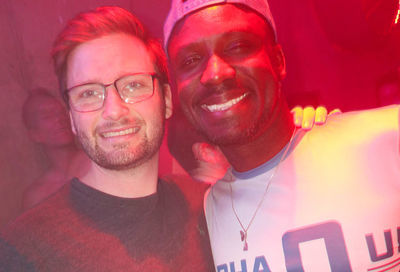Unhappy Together
''Starsky and Hutch'' is a tame comedy dud
It’s fitting that Todd Phillips has been tapped to direct a spoof of The Six Million Dollar Man. Fitting because Phillips appears intent on mooring his fledgling career in parodies of 1970s television action schmaltz. Surely The Bionic Woman, Medical Center and Quincy, M.E. are not too far down on the 34-year-old director’s “To Do ” list.
Phillips’s initial foray into TV’s best-forgotten past, Starsky & Hutch, opened last weekend. With any luck, it will be closed by the time you read this.
 |
Although an improvement over Phillips’s meandering Old School, Starsky & Hutch is a disappointing dud. Aside from one or two painfully obvious gags and some patented banter between Ben Stiller and Owen Wilson, the movie’s chronically flaccid humor is exceedingly tame and pointedly inoffensive. It doesn’t merely go as far as it could — it doesn’t go anywhere at all. The recent throwaway Eurotrip was funnier.
Starsky & Hutch frames its story of two diametrically opposed undercover cops — the by-the-book David Starsky and the casual, devil-may-care Ken Hutchinson — as a love story of sorts. The pair aren’t gay, but they’re awfully sensitive to their inner needs, inevitably pining for one another like a couple of heartsick schoolgirls.
 |
The movie has less of narrative thread than most episodes of the original Starsky & Hutch, as the detectives attempt to nab drug kingpin Reese Feldman (Vince Vaughn), who’s developed a form of undetectable cocaine that resembles artificial sweetener. (Guess what Starsky liberally dumps into his coffee with at one point? Guess what happens next?)
The movie’s tomfoolery comes in part from its raving disco-pounding ’70s setting. Everything from plaid leisure suits to three-foot-wide afros to obnoxious light-brite dance floors make an appearance. Special note must be made of Theodore Shapiro’s music, with its lively Fender-Rhodes riffs, wah-wah guitar embellishments and ’70s action under beat, it’s a dead-on recreation of the TV action music of the era.
 |
The rest of the movie depends on a series of blasé set-ups and deployments. Unfortunately, the best of these — one involving a garage, a gun and a pony, the other involving an idiotic use of hand towels — have been so overexposed in the film’s coming attractions that they’re drained of all comic potential by the time we experience them on screen.
Stiller pitches his performance at one steady level of intensity and maintains it throughout. Has the man ever heard the word nuance? Low-key Wilson, for his part, fades into the background. But then he always fades into the background. It still amazes me that the guy has a movie star career, what with that unfortunate nose and all.
 |
Some critics have heralded as inspired the casting of rap-artist Snoop Dogg as street informant Huggy Bear. I am not of like mind. Dogg seems detached and mildly strung-out. His performance is essence-based. It gives you a whiff of character before dissipating into thin air. The best thing about Dogg’s Huggy Bear are the pimped-out, over-the-top outfits, including a fur-coat of many colors that would inevitably send Mr. Blackwell into a coma.
 |
The movie is a harbor for washed-up careers. Vaughn gives new meaning to the term effort-less, the once-promising Juliette Lewis is reduced to a dimwitted moll, and Chris Penn as an obnoxious fellow cop, lets loose little more than a series of bellows, which, considering Penn’s Orca-sized dimensions, seem entirely appropriate.
|
The biggest wash-ups are saved for the finale when, in a desperate ploy that is more surreal than it is even remotely amusing, Phillips trots out a haggard Paul Michael Glaser and a bloated, grandfatherly David Soul, the original Starsky and Hutch. Their meet and greet with Stiller and Wilson is an uninspired pass-the-torch moment that proves, once and for all, why some torches are best left forever snuffed.
Support Metro Weekly’s Journalism
These are challenging times for news organizations. And yet it’s crucial we stay active and provide vital resources and information to both our local readers and the world. So won’t you please take a moment and consider supporting Metro Weekly with a membership? For as little as $5 a month, you can help ensure Metro Weekly magazine and MetroWeekly.com remain free, viable resources as we provide the best, most diverse, culturally-resonant LGBTQ coverage in both the D.C. region and around the world. Memberships come with exclusive perks and discounts, your own personal digital delivery of each week’s magazine (and an archive), access to our Member's Lounge when it launches this fall, and exclusive members-only items like Metro Weekly Membership Mugs and Tote Bags! Check out all our membership levels here and please join us today!





















